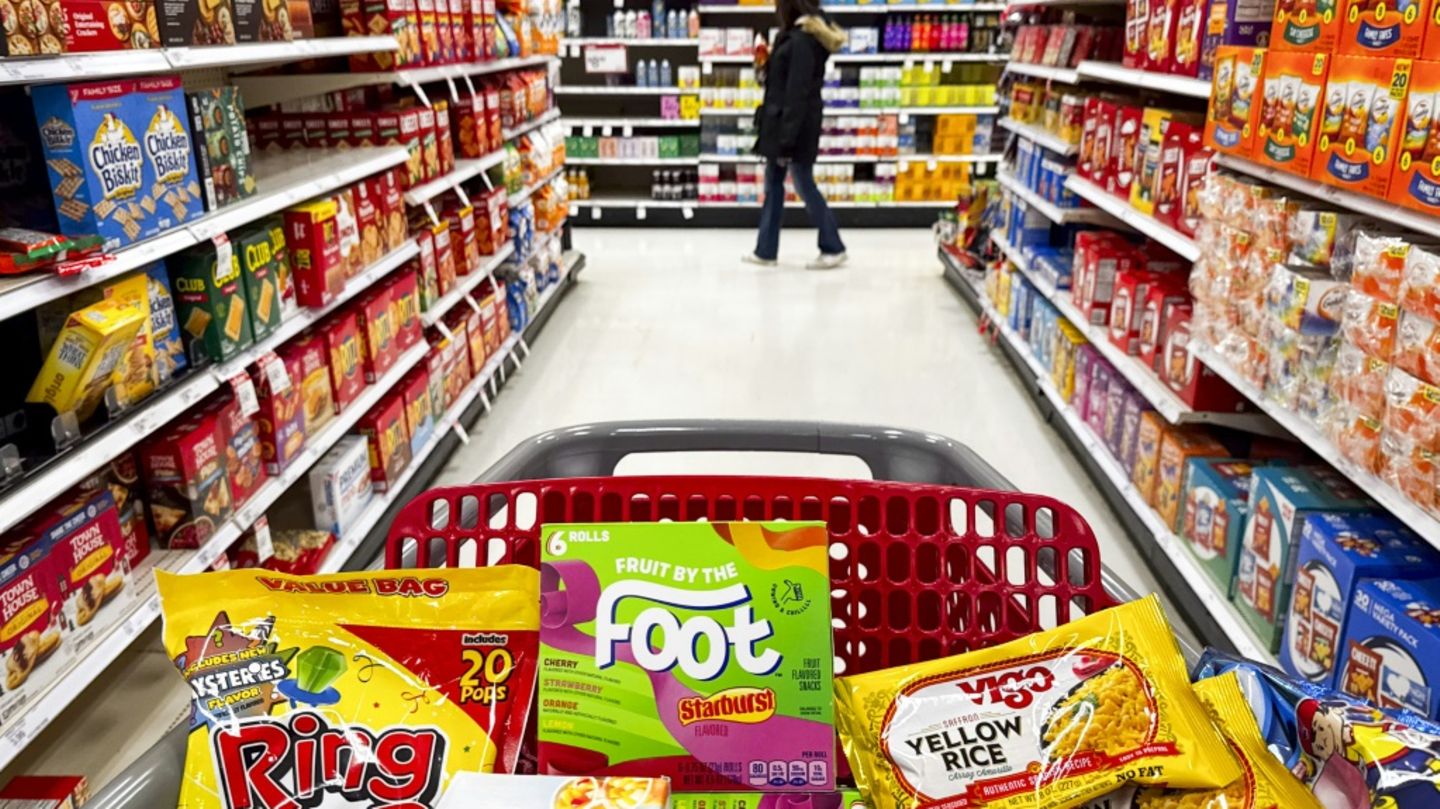
Lesezeit

Die Regierung von US-Präsident Donald Trump will künstliche Farbstoffe aus Lebensmitteln und Medikamenten verbannen. In den vergangenen 50 Jahren hätten “amerikanische Kinder zunehmend in einer giftigen Suppe aus synthetischen Chemikalien” gelebt, sagte der Chef der Lebensmittel- und Arzneimittelbehörde FDA, Marty Makary, am Dienstag vor Journalisten. Er berief sich dabei auf Studien, denen zufolge künstliche Farbstoffe mit Krankheiten wie Diabetes und Krebs sowie Magen-Darm-Problemen und Verhaltensproblemen wie ADHS in Verbindung gebracht werden.
US-Gesundheitsminister Robert F. Kennedy Jr. führt sein Ressort unter dem Motto “Make America Healthy Again” (“Macht Amerika wieder gesund”) – eine Anlehnung an Trumps Slogan “Make America Great Again” (“Macht Amerika wieder großartig”). Er will unter anderem das in der US-Bevölkerung weitverbreitete Übergewicht bekämpfen. Chronische Krankheiten sollen seinem Ministerium zufolge durch die Fokussierung auf “sicheres, gesundes Essen, sauberes Wasser und die Eliminierungen von Giften in der Umwelt” eingedämmt werden.
Im Rahmen seiner “MAHA”-Politik hatte Kennedy auch angekündigt, die US-Lebensmittelherstellung zu überarbeiten. Das Problem der Farb- und Zusatzstoffe bezeichnete er am Dienstag allgemein als eine “existenzielle” Bedrohung. Der neue Plan basiere weitgehend auf der freiwilligen Einhaltung der Vorschriften durch die Lebensmittelbranche, sagte Kennedy. Diese habe sich jedoch in Gesprächen aufgeschlossen gezeigt.
Kennedys Haltung hinsichtlich künstlicher Farbstoffe stimmt mit dem wissenschaftlichen Konsens überein – ganz im Gegensatz zu seinen früheren Äußerungen zu angeblichen Gesundheitsgefahren durch Impfungen. Früher war Kennedy ein angesehener Anwalt für Umweltrecht, bevor er zunehmend mit Verschwörungserzählungen für Aufmerksamkeit sorgte. Allerdings empfahl der Gesundheitsminister jüngst angesichts von mehreren Masern-Ausbrüchen in den USA den Kombinationsimpfstoff gegen Mumps-Masern-Röteln (MMR) als “wirksamste Weise”, die Ausbreitung der Viruserkrankung zu stoppen.
Der nun verkündete Vorstoß der Trump-Regierung hinsichtlich der künstlichen Farbstoffe in Lebensmitteln und Medikamenten wird auch von den US-Demokraten begrüßt. Er sieht vor, die acht zugelassenen künstlichen Lebensmittelfarbstoffe bis Ende 2026 schrittweise zu verbieten. Der Vorschlag baut auf dem Verbot des roten Farbstoffs Nummer Drei durch die Regierung von Trumps Amtsvorgänger Joe Biden auf. Der Zeitplan soll nun aber beschleunigt werden.
In Europa sind die von den US-Behörden genannten Farbstoffe nicht gänzlich verboten. Es besteht aber eine mit Warnhinweisen versehene Kennzeichnungspflicht. Aufgrund dessen haben viele Unternehmen inzwischen auf natürliche Alternativen umgesattelt.
AFP


Lesezeit

Fri 20th Dec, 2024
On December 20, 1999, Portugal officially relinquished control of Macau, a former colony that had been under its governance for more than 400 years. This transition marked a significant shift in the region’s political and economic landscape, transforming Macau into a prominent gambling hub often referred to as the ‘Las Vegas of Asia.’
Unlike Hong Kong, which experienced significant political unrest following its handover to China, Macau has largely maintained political stability. The region, which is significantly smaller in both area and population compared to its neighbor, has become an appealing destination for tourists, primarily due to its extensive gaming industry.
Macau is characterized by its Cotai Strip, a bustling boulevard akin to Las Vegas, where visitors find a plethora of casinos, luxury hotels, and shopping centers. Numerous major companies have established themselves in Macau, drawing inspiration from the iconic resorts of Nevada. This strategic positioning has solidified Macau’s reputation as a leading entertainment destination in Asia.
Historically, Macau’s connection to China deepened long before the 1999 handover. The influence of Chinese culture and politics has been significant, particularly during the Cultural Revolution, which began in 1966. By the time of the handover, the governance of Macau had already shifted largely towards Chinese influence, leading to a unique political landscape that has not seen the same level of protest as Hong Kong.
In the years following the handover, Macau’s economy has thrived, especially after the liberalization of its gaming industry. The introduction of competitive gaming licenses attracted international operators, particularly from the United States, who have significantly contributed to the local economy. As a result, Macau’s GDP has seen remarkable growth, reaching approximately $70,000 per capita by 2023, which surpasses that of Hong Kong and mainland China.
Despite its economic success, the dependency on tourism and gambling raises concerns about sustainability. The local government has recognized this challenge and has been distributing a portion of its budget surplus to residents, ensuring that the population benefits from the economic boom.
Macau’s cultural identity remains complex, with nearly half of its residents originating from mainland China. This demographic composition has influenced local sentiment towards governance and the broader relationship with China. As political changes continue to unfold in the region, Macau has been praised as a model for the ‘One Country, Two Systems’ principle, illustrating a different trajectory from Hong Kong.
As the 25th anniversary of the handover approaches, the question of Macau’s future remains pertinent. While the region continues to flourish as a gambling and entertainment hub, the potential for greater integration with mainland China looms, prompting discussions about the long-term implications for its autonomous status and cultural identity.
In conclusion, Macau’s evolution from a colonial outpost to a vibrant economic center reflects broader trends in regional politics and economics. As it celebrates a quarter-century since its return to Chinese sovereignty, Macau stands as a testament to the complexities of post-colonial governance in the context of a rapidly changing global landscape.

With statutory health insurance contributions set to increase in January 2026, we look at how the proposed increases could affect your wallet – and what steps you can take to keep the financial impact to a minimum.


Legal Initiatives Intensify Around Abortion Pill Access


Allergie- & Immunologietage | Düsseldorf Congress


30 Tage Bikini Workout | Women’s Best Blog


8 Übungen gegen Cellulite | Women’s Best Blog


Cellulite loswerden? Das hilft! | Women’s Best Blog


BRUIT≤ – The Age of Ephemerality


Me Made Mittwoch mit neuen Regeln am 02. Juli 2025


In diesem Blogartikel findest du eine hilfreiche ➤ CHECKLISTE mit ✔ 5 TIPPS, um deine ✔ Zeit besser einzuteilen & deine ✔ Fitness-Ziele zu erreichen! ➤ Jetzt lesen!